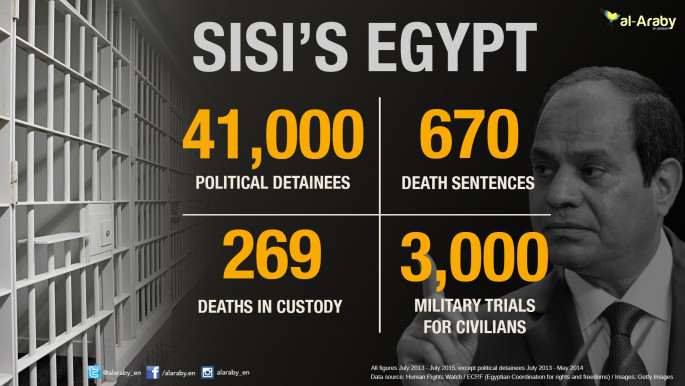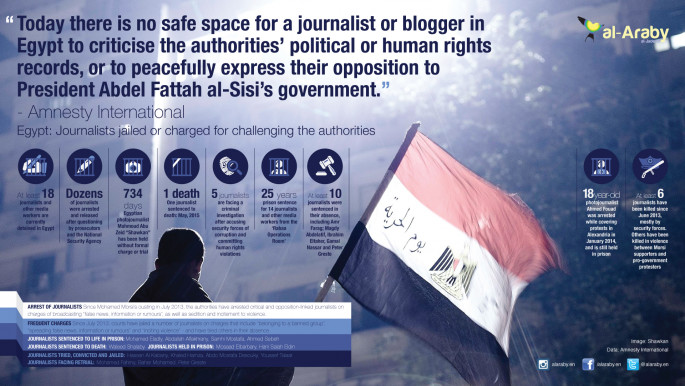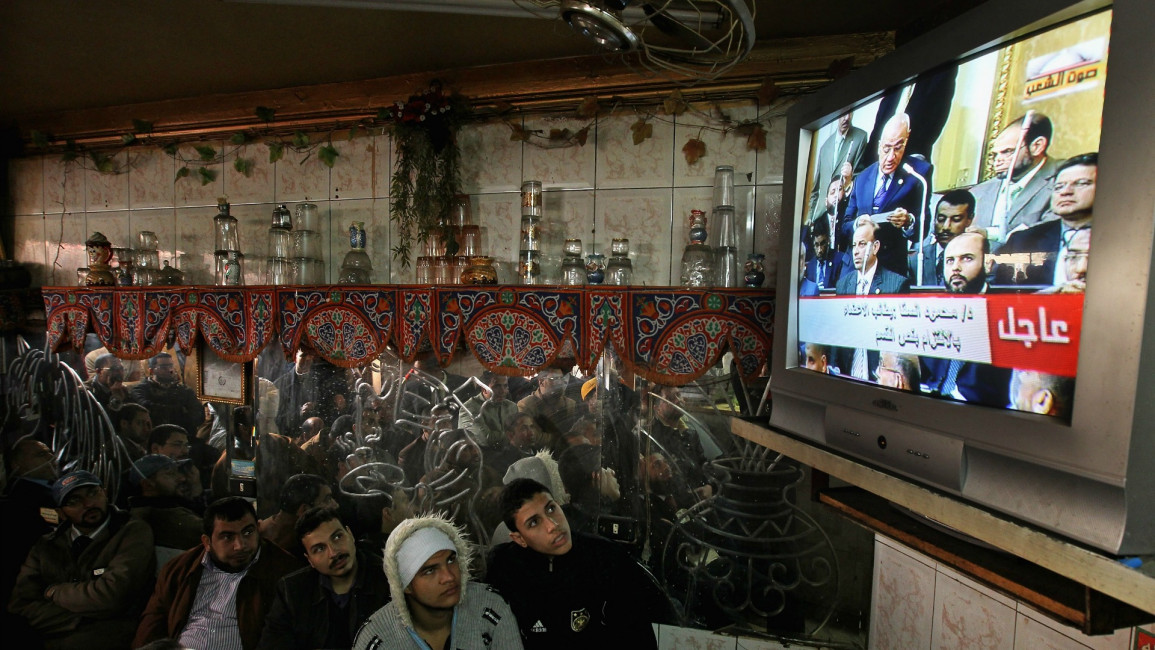
Egypt's media scene is under pressure on all sides
This has been an eventful week in Egypt, to say the least.
It included further arrests of influential human rights activists; a misguided speech by the president attempting to court Israel; Russia offering Egypt the largest loan in its history; and of course, the tragic plane crash that took the lives of 66 people.
And in the middle of all this, changes have been occurring that will affect the country's media structure profoundly, and the way information from weeks like this will reach the local population.
Besides passing a new media law, one which will greatly hamper the establishment and perhaps the continuation of existing online news websites, one of this regime's staunchest allies in the business world began his conquest of Egypt's private media.
Both events will play their parts in a series of small tweaks to the mediascape, as the remaining voices of opposition and relative objectivity are extinguished.
Privately owned television stations have come to dominate viewership in recent years, and have become one of the major determinants of public opinion. One of the first things things would-be President Abdel-Fattah al-Sisi did after deposing Mohamed Morsi was to shut down all of the television stations and newspapers that were in any way supportive of the former president or his Muslim Brotherhood - arresting many media workers in the process.
Sisi then resorted to courting the remaining private media cohort who had agreed to stand in line behind him. For the first year-and-a-half of his presidency, the majority of media outlets in Egypt did indeed toe the line.
In 2016, some of the television stations began to direct more potent criticism towards the regime, especially in the wake of the scandals involving the death of Giulio Regeni and the transfer of sovereignty of two Egyptian islands to Saudi Arabia.
 |
Even though Sawiris was not exactly an outspoken politician, OnTV did provide some of Egypt's rare instances of critical coverage |  |
Sisi did not take kindly to such criticism and had terse words for these media outlets - even those that have essentially been staunchly supportive of him. One of these outlets, OnTV was just sold by telecom tycoon Naguib Sawiris, to steel magnate Ahmed Abu Hashima.
Both are the main funders of influential political parties, but Abu Hashima's party, Mostaqbal Watan [Nation's Future], represents arguably the tightest nexus of business, politics and the presidency. Now his media company, I'lam ElMasreyeen [Egyptians' Media], is looking to expand into a full-scale international media empire.
 |
|
The company already owns a major newspaper, Youm7, which has been notoriously linked to the Egyptian security apparatus.
Even though Sawiris was not exactly an outspoken politician, OnTV did provide some of Egypt's rare instances of critical coverage on its airwaves. Lilian Daoud, an OnTV presenter, is perhaps one of the last prime-time television hosts who was considered by the crowd in the 2011 revolution "one of them".
Her show was mysteriously cancelled on Thursday, less than one week after Abu Hashima's takeover.
If news of further pending television station sales is true, the new media oligarchy will have even closer direct ties to the regime than before.
Unfortunately, the future does not look too bright for independent online media outlets either.
These have provided a platform that offered some of the only examples of an editorial policy that could provide both consistently professional critical coverage, as well as an array of critical opinions on the political, economic and social news of the day, in a legal and transparent manner.
Websites such as Mada Masr, AlBedaiah, Za2ed18 and a handful of others had gained notoriety and respect as a result. The new media law, however, may threaten the ability of these sites to operate legally.
This new "unified" law encompasses the entirety of the mediascape, putting electronic and broadcast media alongside print media. It was praised by the Journalists' Syndicate for offering a new, broader perspective on press freedom.
However, its financial restrictions are both exaggerated and prohibitive for websites, requiring proven minimum capital holdings of 500,000 Egyptian pounds ($56,000) in cash in order to allow these websites to be licensed - the same financial requirement for a weekly newspaper.
 |
This law does not do enough to adapt or encourage the fast-shifting nature of telecommunications |  |
Many of these websites, which tend to have a small, dedicated staff, will find it difficult to deposit that amount of money, which in fact they do not need for their daily operations. The overheads for running a website with two full-time staff members and a website developer, could in theory stay at well under one fifth of that requirement.
These independent news websites, with the collective potential to alter the flow of information in Egypt, are now scrambling to understand how the law will affect them. As online television is also booming, it is unclear whether or not these networks would require further capital minimums.
If they must also be regulated so tightly, online news outlets should receive a set of regulations that take into account the nature of their operations.
This law does not do enough to adapt or encourage the fast-shifting nature of telecommunications, which has already completely changed the decades-old paradigm of broadcast and print media controlling public access to information.
It also leaves a large enough margin for authorities to imprison journalists for doing their job - under pretences of national security.
One thing that is abundantly clear in Egypt is that the nature of the executive branch will ultimately decide on the state of the country's media, more than any legal regulations or business moves could tie the hands of journalists. Change must occur in the general attitude towards the press and media in order for the industry to move in a positive direction.
Mohamed ElMeshad is a journalist and a PhD candidate at SOAS, focusing on the political economy of the media. He has worked extensively in Egypt, Bahrain, West Africa, the UK and US. Recently, he contributed to the Committee to Protect Journalists' book, Attacks on the Press (2015).
Opinions expressed in this article remain those of the author and do not necessarily represent those of The New Arab, its editorial board or staff.
| [click to enlarge] |
 |




